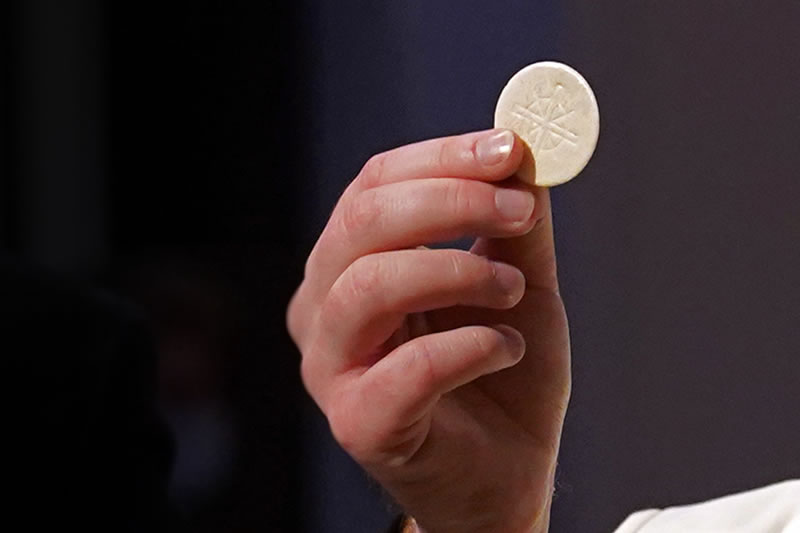Plenary Indulgence
Removes all suffering due to sin
When a plenary indulgence is gained, it removes all temporal punishment from birth until the moment the indulgence was earned. It renders a soul as if newly baptized.
Gaining a Plenary Indulgence
Through the authority Christ gave to his Church, she prescribes the works we need to earn indulgences. They are stated here in general.1
A plenary indulgence can be earned only once a day (except at the moment of death, when one can obtain a plenary indulgence if one has already been earned that day.)2
There are four works to earn one plenary indulgence that can be performed in any order:
The first three are called the Three Constants. These must be performed every time we work for plenary indulgence. These are Sacramental Confession, Eucharistic Communion, and Prayers for the Pope’s Intentions.
- Confess your sins in the Sacrament of Reconciliation.3(N20.1) The confession can be made about 20 days before or after the required work. One confession is good to earn several plenary indulgences.4 The interior disposition is to detach oneself from all sin.
- Receive Holy Communion. 5 One does not need to attend mass (especially in places where there are a lack of priests to celebrate daily mass,) but it is suggested.
- Pray for the intentions of the pope. 6 One Our Father, and one Hail Mary will satisfy this requirement.
- Do any of the prescribed works. See the Visual Reference below.
Works No. 1, 2, and 3 above can be done twenty days before or after work No. 4. However, it is fitting that receiving Holy Communion and praying for the pope is done on the same day that work No.4 is done. 7
Visual Reference
WITH THE INTENTION OF GAINING AN INDULGENCE
PERFORM THE “THREE CONSTANTS”
IN A DISPOSITION OF HAVING NO ATTACHMENTS TO SIN
PLUS DOING ANY ONE OF THE FOLLOWING PRESCRIBED WORKS
Author's Note: replay broadcasts don’t count; it has to be live.
A plenary indulgence is granted to the faithful who:
- visit the Blessed Sacrament for adoration lasting at least a half hour;
- piously recite the verses of the Tantum Ergo after the Mass of the Lord’s Supper on Holy Thursday during the solemn reposition of the Most Blessed Sacrament;
- devoutly participate in a solemn Eucharistic procession, held inside or outside a church, of greatest importance on the Solemnity of the Body and Blood of Christ;
- participate religiously in the solemn Eucharistic celebration which is customarily held at the conclusion of a Eucharistic congress.
A plenary indulgence is granted to the faithful who:
- receive Holy Communion for the first time or devoutly assist at the first Holy Communion of others;
- on any of the Fridays of Lent devoutly recite after Communion the prayer En ego, O bone et dulcissime Iesu before a crucifix.
- A priest who administers the sacraments to someone in danger of death should not fail to impart the apostolic blessing to which a plenary indulgence is attached.
- If a priest is unavailable, Holy Mother Church benevolently grants to the Christian faithful, who are duly disposed, a plenary indulgence to be acquired at the point of death, provided they have been in the habit of reciting some prayers during their lifetime; in such a case, the Church supplies for the three conditions ordinarily required for a plenary indulgence.
- In this latter case, the use of a crucifix or a cross in obtaining the plenary indulgence is commendable.
- The faithful can obtain this plenary indulgence at the hour of death, even if they have already acquired a plenary indulgence on that same day.
- The catechetical instruction of the faithful should ensure that they are duly made aware and frequently reminded of this salutary benefaction of the Church.
(Adoration of the Cross and Way of the Cross)
A plenary indulgence is granted to the faithful who:
- devoutly assist at the adoration of the Cross in the solemn liturgical action of Good Friday; or
- personally make the pious Way of the Cross, or devoutly unite themselves to the Way of the Cross while it is being led by the Supreme Pontiff and broadcast live on television or radio.
In the pious exercise of the Way of the Cross, we recall anew the sufferings which our divine Redeemer endured while going from the praetorium of Pilate, where he was condemned to death, to Mount Calvary, where he died on the cross for our salvation.
Regarding the acquisition of the plenary indulgence, the following is prescribed:
- The pious exercise must be made before stations of the Way of the Cross legitimately erected.
- To erect the Way of the Cross, fourteen crosses are needed, to which it is customary to attach a picture or image representing the fourteen stations of Jerusalem.
- According to common custom, the pious exercise consists of fourteen devotional readings, to which some vocal prayers are added. To make the Way of the Cross, however, it is sufficient to meditate devoutly on the Lord’s Passion and Death, and therefore reflection on the particular mysteries of the individual stations is not necessary.
- Progression from one station to the next is required. If the pious exercise is made publicly, and moving from station to station by all participants is not possible without inconvenience, it is sufficient that at least the one conducting the Way of the Cross progress from station to station, while the others remain in their place.
- Those legitimately impeded can acquire the same indulgence, if they spend some time, e.g., at least a quarter of an hour, in reading and meditating on the Passion and Death of Our Lord Jesus Christ.
- Equivalent to the pious exercise of the Way of the Cross, even with regard to obtaining the indulgence, are other pious exercises, approved by competent authority, which call to mind the memory of the Passion and Death of our Lord, likewise with the prescribed fourteen stations.
- For those belonging to the Eastern Churches, where this pious exercise may not exist, the indulgence can be acquired by means of some other pious exercise in memory of the Passion and Death of our Lord Jesus Christ, accordingly as each patriarch has established for his own faithful.
Author's note: Norm 15 specifies a crucifix, cross, rosary, scapular, or medal
A plenary indulgence is granted to the faithful who:
- devoutly recite the Marian rosary in a church or oratory, or in a family, a religious community, or an association of the faithful, and in general when several of the faithful gather for some honest purpose;
- devoutly join in the recitation of the rosary while it is being recited by the Supreme Pontiff and broadcast live by radio or television.
Author's note: replay broadcasts don’t count; it has to be live.
In other circumstances, the indulgence will be partial.
The rosary is a prayer formula consisting of fifteen decades of Hail Marys preceded by the Our Father, during the recitation of which we piously meditate on the corresponding mysteries of our redemption.
Regarding the plenary indulgence for the recitation of the Marian rosary, the following is prescribed:
- The recitation of a third part of the rosary is sufficient, but the five decades must be recited without interruption.
- Devout meditation on the mysteries is to be added to the vocal prayer.
- In its public recitation the mysteries must be announced in accord with approved local custom, but in its private recitation it is sufficient for the faithful simply to join meditation on the mysteries to the vocal prayer.
Author's note: "The recitation of a third part of the rosary" means five mysteries. The manual was published in 1999 when at that time there were 15 mysteries, so one-third of this is five. It was in 2002 when Pope St. John Paul II added the five Luminous Mysteries, bringing the total to 20. It is the common understanding that praying Five Mysteries are what is prescribed to gain a plenary indulgence.
[Grant 17.2]Regarding the plenary indulgence for the recitation of the hymn Akathistos, it need not be recited in full, but it suffices that there be an uninterrupted recitation of some suitable part, according to legitimate custom.
Among the faithful of the Eastern Churches, where the practice of these devotions does not exist, other similar exercises in honor of the Blessed Virgin Mary, as established by the patriarchs, enjoy the same indulgences. [Grant 23.1]
A plenary indulgence is granted to the faithful who:
- the Veni Creator, either on the first day of the year to implore divine assistance for the course of the whole year, or on the solemnity of Pentecost;
- the Te Deum, on the final day of the year, to offer thanks to God for gifts received throughout the course of the entire year.
A plenary indulgence is granted to:
- a priest celebrating his first Mass before the people on a chosen day;
- the faithful who devoutly assist at such a Mass.
Similarly, a plenary indulgence is granted to:
- priests celebrating the twenty-fifth, fiftieth, sixtieth, and seventieth anniversary of their priestly ordinations, who renew before God their promise of faithfully fulfilling the duties of their vocation;
- bishops celebrating the twenty-fifth, fortieth, and fiftieth anniversaries of their episcopal ordination, who renew before God their promise of faithfully fulfilling the duties of their office;
- the faithful who devoutly assist at jubilee Mass celebrations.
A plenary indulgence, applicable only to the souls in purgatory, is granted to the faithful who,
- on any and each day from November 1 to 8, devoutly visit a cemetery and pray, if only mentally, for the departed;
- on All Souls’ Day (or, according to the judgment of the ordinary, on the Sunday preceding or following it, or on the solemnity of All Saints), devoutly visit a church or an oratory and recite an Our Father and The Creed.
If for some good reason a person is unable to read the Sacred Scriptures, a plenary or partial indulgence is granted, as above, if the text of Sacred Scripture is listened to while another person is reading or if it is heard by means of a video or audio recording. [Grant 30.2]
A plenary indulgence is granted to the faithful who visit, and there devoutly recite an Our Father and The Creed,
- one of the four Patriarchal Basilicas in Rome, either as part of group making a pilgrimage to the basilica, or at least with the purpose of expressing during the visit filial submission to the Roman Pontiff;
Author’s note: The Four Major Basilicas in Rome are Saint John Lateran Basilica, St. Peter’s Basilica, Saint Paul Outside the Walls, and Saint Mary Major (Maria Maggiore)
- a minor basilica
- on the solemnity of the holy Apostles Peter and Paul;
- on the solemnity of its Titular;
- on August 2, the day of the “Portiuncula” indulgence;
- once a year, on a day chosen by the Christian faithful;
- the cathedral church
- on the solemnity of the holy Apostles Peter and Paul,
- on the solemnity of its Titular;
- on the liturgical celebration of the Cathedral of St. Peter, the Apostle;
- on the dedication of the Archbasilica of the Most Holy Savior;
- on August 2, the day of the “Portiuncula” indulgence;
- an international, national, or diocesan shrine established by competent authority
- on the solemnity of its Titular;
- once a year, on a day chosen by the Christian faithful;
- as often as they assist in a group pilgrimage visiting the shrine;
Author's note: Philippine National Shrines are
National Shrine of Our Lady of the Visitation of Guibang (Diocese of Ilagan)
National Shrine of La Virgen Divina Pastora, Three Kings Parish (Diocese of Cabanatuan)
National Shrine of Our Lady of the Abandoned Parish – Santa Ana Church (Archdiocese of Manila)
National Shrine of Saint Michael and the Archangels (Archdiocese of Manila)
National Shrine of Saint Jude Thaddeus (Archdiocese of Manila)
National Shrine of Our Lady of Guadalupe (Archdiocese of Manila)
International Shrine of the Sacred Heart (Archdiocese of Manila)
Minor Basilica and National Shrine of San Lorenzo Ruiz – Binondo Church (Archdiocese of Manila)
National Shrine of Our Lady of Mount Carmel (Diocese of Cubao)
National Shrine of Our Lady of Lourdes (Diocese of Cubao)
National Shrine of Our Lady of the Holy Rosary, La Naval de Manila (Diocese of Cubao)
National Shrine and Parish of St. Anne (Diocese of Malolos)
National Shrine and Parish of the Divine Mercy (Diocese of Malolos)
National Shrine of Our Lady of Salambao – Obando Church (Diocese of Malolos)
National Shrine of Our Lady of Fatima (Diocese of Malolos)
National Shrine of Our Mother of Perpetual Help – Baclaran Church (Diocese of Parañaque)
Our Lady of the Miraculous Medal National Shrine Parish (Diocese of Parañaque)
National Shrine of Mary Help of Christians Parish (Diocese of Parañaque)
Parish and National Shrine of Saint Padre Pio (Archdiocese of Lipa)
National Shrine and Parish of Nuestra Señora Virgen de la Regla (Archdiocese of Cebu)
National Shrine of St. Joseph (Archdiocese of Cebu)
National Shrine of Our Lady of Peace and Good Voyage – Antipolo Cathedral (Diocese of Antipolo)
Our Lady of Peñafrancia Basilica Minore and National Shrine (Archdiocese of Caceres)
National Shrine of Our Lady of La Salette (Diocese of Imus)
National Shrine of Our Lady of Candles (Archdiocese of Jaro)
Parish and National Shrine of Our Lady of Sorrows (Diocese of Lucena)
National Shrine of St. Anthony of Padua (Diocese of San Pablo)
- a parish church
- on the solemnity of its Titular;
- on August 2, the day of the “Portiuncula” indulgence;
- a church or an altar on the day of its dedication;
- a church or an oratory of institutes of consecrated life and societies of apostolic life, on the liturgical memorial of their founder.
Similarly, a plenary indulgence is granted to the faithful who assist in the sacred functions held in any stational church on its designated day; if they merely visit the church devoutly, the indulgence will be partial.
[Grant 33.2]Throughout the year, or on special years or occasions, the Church provides additional opportunities to gain a plenary indulgence by prescribing a work. This prescribed work takes the place of work No. 4. One still has to do works Nos. 1 to 3 (the Three Constants) to fulfill the requirements of obtaining a plenary indulgence. If some of the requirements of work No. 4 are not met, one may still merit a partial indulgence as prescribed by the concession.
Example
Let's say you want to gain a plenary indulgence today and you go to confession, receive communion, pray for the pope's intentions, and go to Eucharistic adoration for 30 mins. Tomorrow, if you want to gain another plenary indulgence by doing another Eucharistic adoration, you need to receive communion and pray for the pope's intentions. You do no need to go to confession again (unless of course you've incurred a mortal sin) because the confession you did today is good for gaining other plenary indulgences in the next 20 days.Tips & Suggestions
If you want to make sure you can work for a plenary indulgence any time you can, go to confession the same day every month. That will cover 20 days before and 20 days after any prescribed act.If you want, why not give your gained indulgences to Mary so she can choose to whom she wants to dispense it.
Plenary Indulgence Dates
This section shows the plenary indulgences listed above, but listed chronologically so that the faithful can mind the next day that an indulgence can be gained. This is not an exhaustive list.
| First day of the year January 1 |
Pray the Veni Creator. [Grant 26.1.1] |
| Easter Vigil | Make a renewal of Baptismal Vows. [Grant 28] |
| Fridays of Lent | Pray the En ego, O bone et dulcissime Iesu before a crucifix. [Grant 8] |
| Mass of the Lord’s Supper on Holy Thursday |
Pray the Tantum Ergo [Grant 8] |
| Good Friday | Make an adoration of the Cross. [Grant 13.1] |
| Good Friday | Makes a pious Way of the Cross or unites themselves to the Way of the Cross while it is being led by the Pope in a live (not replay) broadcast. [Grant 13.2] |
| Pentecost | Pray the Veni Creator. [Grant 26.1.1] |
| Solemnity of the Body and Blood of Christ | participate in a Eucharistic procession. [Grant 7] |
| Solemnity of the Most Sacred Heart of Jesus | Pray Iesu dulcissime. [Grant 3] |
| Solemnity of Peter and Paul 29 Jun 2022 |
Visit his/her cathedral and recites an Our Father, and The Creed. [Grant 14.1] |
| Solemnity of Peter and Paul 29 Jun 2022 |
Use an object of piety (crucifix, cross, rosary, scapular, or medal) that is blessed by the Pope or any bishop, and pray an Our Father, and The Creed. [Indulgentiarum Doctrina N.17] |
| Portiuncula Indulgence 2 August 2022 |
Visit a minor basilica, cathedral, or parish church, and there devoutly pray an Our Father, and The Creed. [Grant 33] |
| Suffrage for the Souls in Purgatory Any day from 1 November to 8 November |
Devoutly visit a cemetery and pray for the departed. The indulgence is applied to the departed. [Grant 29.1.2] |
| All Soul's Day 2 November |
Visits a Church or oratory and recite and Our Father, and The Creed. The indulgence is applied to the departed. [Grant 29.1.2] |
| Solemnity of Christ the King | Pray the Iesu dulcissime Redemptor. [Grant 2] |
| Last day of the year 31 December |
Pray the Te Deum. [Grant 26.1.2] |




